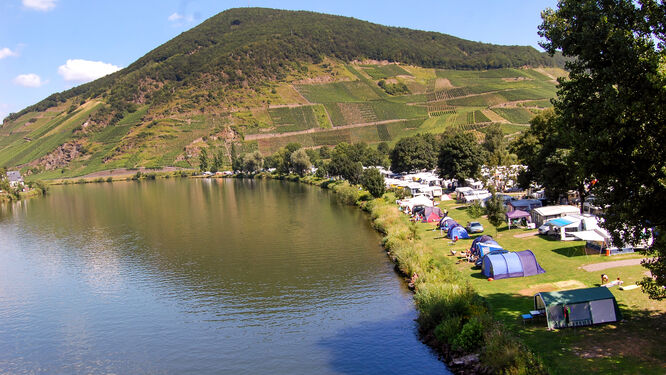Camping European Style
By Rick Steves
Camping in Europe is more a social experience than a chance to retreat to nature. There, it’s the middle-class family way to travel, and it's cheap. Relatively few Americans take advantage of the thousands of available campgrounds, but those who do give rave reviews. A tent, pillow, and sleeping bag are all you need.
In the US, we think of campgrounds as picturesque outposts near a lake or forest. By contrast, European "campings" (the international word for campgrounds) are often located within or on the outskirts of an urban center and can range from functional (like park-and-rides) to vacation extravaganzas, with restaurants, mini water-parks, and miniature golf. Many campgrounds have small grocery stores and washing machines. In general, European campgrounds are less private than American versions, and many forbid open fires.
Aside from the biggest cities, most tourist-friendly areas have a campground within a reasonable walk or bus ride from the town center or train station. And if you're camping outside a major city, the money you save on parking alone will likely pay for your campsite (leave your car at the campground and take the handy bus downtown).
Campgrounds generally mirror their surroundings: If the region is overcrowded, dusty, dirty, unkempt, and chaotic, you're unlikely to find an oasis behind the campground's gates. A sleepy Austrian valley will probably offer a sleepy Austrian campground.
Campgrounds can fill up. But if they do, the "Full" sign usually refers to motorhomes and trailers. A small tent can almost always be squeezed in somewhere. However, "weekend campings" are rented out on a yearly basis to local urbanites, and often are full or don't allow what they call "stop-and-go" campers (you). Camping websites indicate which places are the "weekend" types.
Cost: Prices at European campgrounds vary according to facilities and style, but don't be surprised if you're asked to pay by the tent, the person, and the vehicle. A camper who bicycles in might pay $3, plus $5 for the tent; a couple driving into the same site might pay $6 for the two of them, $5 for their tent, and $4 for their car.
Registration and Regulations: Camp registration is easy. As with most hotels, you show your passport, fill out a short form, and learn the rules. Quiet is enforced beginning at 10 or 11 p.m., and checkout time is usually noon. English is the second language of campings throughout Europe, and most managers will understand the monoglot American.
Services: Not every campground will take tents; some are RV only. Most campgrounds have laundry facilities and great showers with metered hot water — carry coins and scrub quickly. Larger campgrounds may have a grocery store and café (a likely camp hangout with an easygoing European social scene).
Equipment: You can bring your gear with you — or buy it in Europe. Tents, sleeping bags, and cooking supplies are cheaper at large European superstores than at specialty backpacking stores. I'd start without a stove, keeping meals simple by picnicking and enjoying food and fun in the campground café. If you don't want to bog down with equipment, consider a place that can set up a tent site for you (see "Turn-Key Camping" below).
Safety: Campgrounds are remarkably low-theft. Campings are full of basically honest, middle-class European families, and someone's at the gate all day. Most people just leave their gear in their vans or zipped inside their tents.
Kids: A family can sleep in a tent, van, or motorhome a lot cheaper than in a hotel. Camping offers plenty to occupy children's attention, namely playgrounds that come fully equipped with European kids. As your kids make friends, your campground social circle widens. Campgrounds are filled with Europeans in the mood to toss a Frisbee with a new American friend.
Turn-Key Camping: Many of Europe's campgrounds offer sites already set up with a tent, trailer, or mobile home and outfitted with linens and kitchen gear. Two British companies are a good place to start: Eurocamp.co.uk and CanvasHolidays.co.uk contract with campgrounds across continental Europe. For a step up from camping, try "glamping" in a yurt or a cabin (check EuroGlamping).
RV Camping: Each country has companies specializing in camper van and motorhome rentals. Look for one with a pickup and drop-off location that makes sense for your itinerary. For example, McRent has 50 rental depots across Europe: AnywhereCampers offers one-way RV rentals. In Iceland, you can rent a fully equipped RV at the airport through HappyCampers and camp your way around the island.
Another bonus to camper-van travel: Across Europe, with a camper van or motorhome, you can sleep overnight for free in any legal parking space, including rest stops on national motorways (look for a big blue and white P sign).

